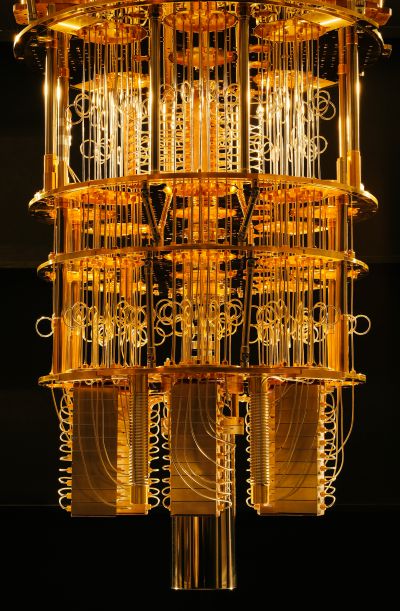Symbolic Quantum Simulation
양자컴퓨터는 일반 컴퓨터보다 왜 빠를까? 신문 잡지의 수많은 글이 있지만, 사실 위 질문에 대한 명쾌한 답을 주는 글은 거의 없다. 아이러니하게도 물리학과 양자역학을 수강한 학생이라면 위 질문에 대한 답을 쉽게 찾을 수 있다. 본 인턴 프로그램에서는 양자컴퓨터의 가장 기초적인 원리를 소개하고 몇 가지 대표적인 예를 통하여 양자컴퓨터가 일반 컴퓨터보다 왜 빠를 수 있는지 스스로 깨달을 수 있도록 한다. 모든 과정은 본 그룹에서 개발한 Mathematica(R) Application Q3를 이용하여 불필요하게 지루한 계산을 피할 뿐만 아니라 양자컴퓨터의 동작을 시뮬레이션 할 수 있도록 한다.
양자제어 인턴과정은 크게 정규과정과 중급과정, 고급과정으로 나뉜다. 정규과정은 기본적인 양자정보처리 과정을 공부한다. 중급 및 고급과정에서는 양자 앨거리즘을 물리학적 관점에서 이해하며 여러 가지 양자현상에 응용하는 방법을 익히게 된다.
About Simulation
원래 시뮬레이션(simulation)은 뭔가를 정확하게 계산하거나 이해할 수 없을 때 컴퓨터의 도움을 빌려 어림이나 흉내 내기를 통해 계산하는 보조수단을 말한다. 그러나 양자제어 연구실에서 시뮬레이션은 컴퓨터에 양자역학 원리를 가르침으로써 스스로 양자물리학을 배우고 익히는 방법으로 쓰인다. Mathematica(R)에게 양자컴퓨터가 하는 계산을 따라 할 수 있도록 가르칠 수 있다면, 스스로는 이미 그 방법을 잘 이해하고 있는 것 아니겠는가?
뭔가를 배우고 익히는데 가르치는 것만큼 좋은 방법도 드물다. 학문이 아무리 깊다 해도 막상 가르쳐 보면, 자신이 미처 알지 못하는 부분이 적지 않다는 것을 알게 되기 때문이다. 이 점을 잘 드러낸 말이 중국 고전 "예기"의 "학기" 편에 나오는 "교학상장(敎學相長)"이다.[1]
따라서, 아래와 같은 말을 양자제어 인턴과정의 좌우명으로 삼을 만하다.
뛰어난 학생은 하나만 가르쳐도 열을 배우고, 훌륭한 스승은 하나를 가르치기 위해 열을 익힌다.
Regular Course
This internship program is for beginners in quantum computing. They can learn how quantum computers work, what quantum computation is, and the physical principles behind quantum computation. The internees are supposed to have taken the course Quantum Mechanics I.
- Introduction to the Q3 Application (1 week): You can try and get started with the Quisso package. The experienced graduate students in the QC Lab will guide you through installing and using the package. You will have chances to apply the package to some basic textbook examples of quantum mechanics.
- Single-Qubit Gate Operations (1 week): As the starting point of the quantum computing, single-qubit gate operations will be studied and their elementary properties will be examine. These properties will be used repeatedly in later studies on more advanced topics.
- Two-Qubit Gate Operations (2 week): In some sense, one can say that all the power of quantum computing is hidden in the two-qubit operations. Surprisingly, all two qubit operations are reduced to the single gate operation, i.e., CNOT. How? You can find it for yourself in this study.
- Multi-Qubit Controlled-U Gates (2 week): Many interesting tasks with quantum computers can be expressed in terms of a unitary gate controlled by multiple qubits. The efficiency of quantum algorithms crucially depends on how such a gate operation is implemented by means of elementary gates. There are several available methods. Some of them require only linearly-increasing computational costs while others are easier for a smaller number of qubits.
- Universal Quantum Computation (2 week): You will prove that any unitary operation eventually breaks down to single-qubit operations and CNOT gate.
Intermediate Course
Motivated students are encouraged to move on and take the Intermediate Internship Program, where the following topics can be explored. This program is recommended to those who have already taken either the course Quantum Information Physics or the Regular Internship Program.
- Quantum Fourier Transform: This is the first example which exhibits an exponential speed-up compared with the classical algorithm. Quantum Fourier transformation also serves as the core of many quantum algorithms and protocols.
- Quantum Phase Estimation: All known quantum algorithms are essentially quantum phase estimation or its variation. It also provides some transparent insights to the so-called quantum parallelism.
- Quantum Theory of Measurement as Quantum Phase Estimation: This is an application of the quantum phase estimation, which provides an interesting (and powerful) twist of the quantum theory of measurement.
Advanced Course
More determined students are encouraged to take the Advanced Internship Program by choosing one of the following topics. Each topic would take half a semester or one depending on individual students.
- Shor's Factorization Algorithm: To be described later.
- Glover's Serrch Algorithm: To be described later.
- One-Way Quantum Computation: Introduction: To be described later.
- Quantum Computer Based on Superconducting Circuit: Introduction: To be described later.
- Quantum Information Theory: Inroduction: To be described later.
Notes
- ↑ "사람이 배운 뒤에라야 자신이 부족하다는 점을 알 수 있으며, 가르쳐본 다음에라야 비로소 어려움을 알 수 있다. ... 그러므로 가르치고 배우면서 함께 성장하는 것이다." "교학상장"이라는 말은 원래 2016학년도 인턴 팀의 이름이었다. 시뮬레이션을 가르치는 기회로 삼아 스스로 배우고 익혀 보라는 뜻을 잘 이해한 이 팀은 이름도 이 말로 지었다.
